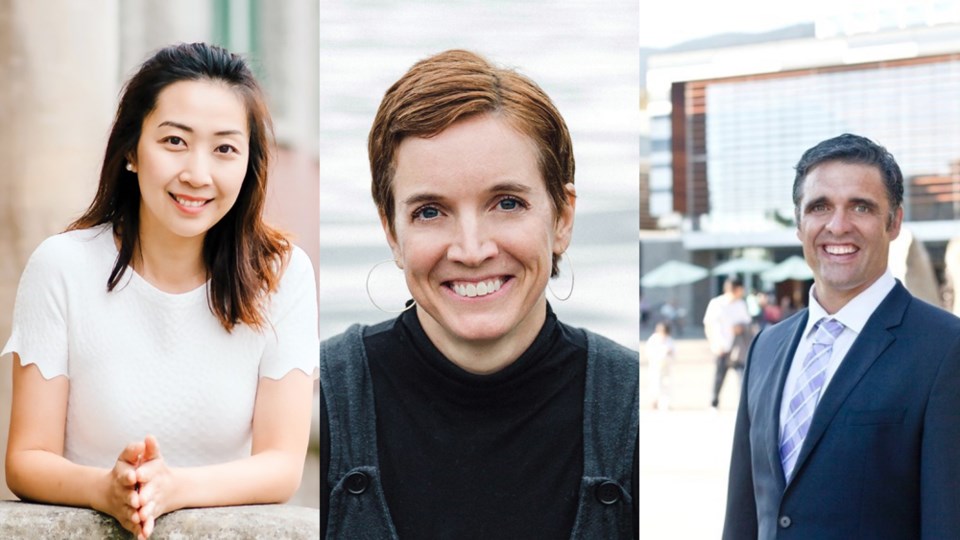Three current elected council members are bowing out of local government on the North Shore at the end of this term.
District of West Vancouver Coun. Craig Cameron, District of North Vancouver Coun. Megan Curren and City of North Vancouver Coun. Tina Hu did not seek nominations for the Oct. 15 municipal election.
All three have been, for the most part, voices for progressive policies on their respective councils, when it comes to housing, transportation and the environment.
Curren said she is leaving after one term specifically to make room for younger candidates who will have more at stake.
“Young people inherit the consequences of government action and inaction, and they should be making decisions about their future. I encourage more incumbents to step aside to create space for underrepresented and marginalized voices,” she said.
Curren’s contributions at council frequently went beyond mere incremental policy change and into the realm of broader systemic change. She brought forward the motion in 2019 for the district to declare a climate emergency, and she spent much of the term pushing the district to draw down local greenhouse gas emissions at every opportunity.
“I’m leaving behind a legacy of embedding climate, biodiversity, equity, and reconciliation in our work and that’s what I wanted to accomplish in response to the planetary health crisis,” she said. “The world is literally flooding and burning. We have to stop micromanaging and start governing. The community I want to be of rises to this moment in history in global solidarity.”
Curren is endorsing candidates Harrison Johnston, 23, and Ellison Mallin, 27.
Cameron, who has served three terms on West Vancouver council, said he wants to focus more on his career and family again, but also, he added, the steep decline in civil discourse from a “vocal minority” helped pushed him to the decision.
“They're just really miserable and they're nasty and I don’t want to marinate in that kind of toxic soup anymore. I felt like I needed a break from it,” he said.
Cameron said the worst vitriol came in whenever council was considering any kind of change in the municipality.
“It is fairly easy to be popular in West Vancouver, I think, if you just don't change anything,” he said. “That's not why I got into politics. I got into politics to do what I think was right and important, and to do what the community, I think, needs going forward.”
To whoever is elected to his seat, Cameron suggests having some thicker skin, especially if they’re planning to vote in favour of any progressive causes.
“You're more of a target when you're advocating for changes to the status quo, when you're talking about housing affordability and talking about equity, and talking about environmental sustainability,” he said. “Some people don't want to hear that message.”
Hu, who was first elected in 2018, shared her rationale for stepping away from public life on Twitter.
“It is definitely not an easy decision. At each stage of our life, there are different priorities, my priority in the next few years will be my family and my professional work,” she wrote, adding thanks to the city’s residents and her supporters over the last term.
Hu highlighted the city’s efforts in promoting equity, diversity, inclusion and reconciliation among her proudest accomplishments from the last four years.
“CNV is a diverse and inclusive city, and we should see diverse representation at council table as well. Putting your name on the ballot is not easy, sending my respect to all the candidates. I wish everyone who is running the best of luck!” she wrote.
The power of incumbency is strong in North Shore politics. Across all three municipalities, only three council members have failed in their re-election bids since 2011, while the re-election rate for incumbents across B.C. is typically around 80 per cent.
Correction: This article has been amended since first posting to correct the spelling of the name of District of North Vancouver council candidate Ellison Mallin.



